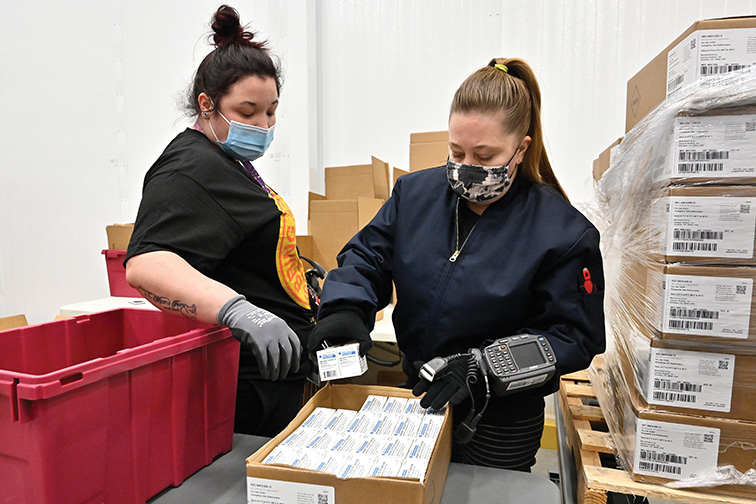Higher freight volumes got the year 2021 off to a good start, according to reports from several industry sources.
The American Trucking Associations’ (ATA) seasonally adjusted For-Hire Truck Tonnage Index reached 114.6 in January, a 1.4% increase over December’s index. In a year-over-year comparison with January 2020, ATA’s index fell 2.1%. However, in a full-year comparison the index for 2020 was 4% lower than the 2019 index and ended the year much better than anticipated earlier in the year.
“Over the last four months, the tonnage index has increased a total of 3.3%, which is obviously good news” said Bob Costello, chief economist for ATA. “However, the index is still off 2.8% from the high in March as tonnage plunged 9% in April alone. I continue to expect a nice climb up for the economy and truck freight as we get more economic stimulus and increased vaccination numbers.”
Economic stimulus and vaccinations are on the minds of many as we approach the end of the first quarter of 2021.
DAT’s Truckload Volume Index for January also declined from December numbers, by 2.0%, but bested January 2020 numbers by 7.5%.
“The headwind of COVID-19 is mixing with the tailwinds of vaccine distribution and economic stimulus,” said Ken Adamo, chief of analytics for DAT. “There’s still uncertainty about whether consumers will continue to spend, what they’ll buy now and how networks will respond as e-commerce drives more final-mile delivery and fulfillment houses move closer to where customers live.”
A key difference between the ATA and DAT numbers is the type of rates measured. The ATA index is dominated by contract freight, which typically is slower to respond to both volume and rate changes. The DAT index, on the other hand, is comprised of mostly spot market freight, which is much more likely to change quickly.
As 2021 progresses, spot freight rates on the DAT board have leveled off and are experiencing small declines in some areas. At the same time, haulers of contract freight are capitalizing on the surge in spot rates that took place in the second half of last year, adjusting or renewing customer contracts to reflect higher rates.
During a three-day virtual seminar hosted by ACT Research Feb. 22-24, Sam Kahan, chief economist for ACT was optimistic.
“Distribution of effective COVID vaccines and additional government stimulus are drivers of economic growth in 2021 and 2022,” he said. “Transportation and freight activity will shine as a result.”
One factor that will undoubtedly push freight rates higher is the backlog of ships waiting to unload in West Coast harbors. A nine-month dockworker labor dispute at 29 West Coast ports resulted in dozens of ships left waiting to unload, a process that’s expected to take several months.
Tim Denoyer, ACT’s vice president and senior analyst, explained how the shipping delays will impact trucking.
“The unprecedented backlog of freight waiting to come onshore provides unusually good visibility to strong freight demand, while supply side challenges are keeping the freight markets tight, so we expect the vigorous recovery in carrier earnings and commercial vehicle demand to persist,” he said.
Additionally, import shipments have increased as foreign manufacturers resume full production after COVID shutdowns and capacity reductions.
One probable effect of the delay in receiving imports is a potential shortage of parts, including semiconductors needed by U.S. truck manufacturers. Any type of parts shortage can impact production numbers, slowing delivery of new trucks to the market and potentially impacting capacity.
Tightened trucking capacity is responsible for increased freight rates, including record spot rates set during the fourth quarter of 2020.
Cass Information Systems issues several monthly indexes, including the Cass Freight Index for Shipments. That index showed a 3.0% increase in shipments for January over December, and an 8.6% percent increase compared to January 2020.
“This acceleration takes us another step closer to the strong growth environment which we expect to continue in 2021, due in no small part to easy comparisons,” noted ACT’s Denoyer, writer of the Cass Freight release.
Vaccinations for COVID are proceeding in the U.S. and could accelerate with the recent FDA approval of the Johnson & Johnson version of the vaccine. The J&J vaccine requires only one vaccination to be effective, as opposed to two shots from competitors Moderna and Pfizer-BioNTech. The Johnson & Johnson product does not need to be shipped and stored at ultra-low temperatures as the other two vaccines do, although Pfizer recently announced that its version can now be simply refrigerated.
With COVID-19 vaccines becoming more widely available, the economy could soon see businesses that have been shuttered due to pandemic restrictions reopening, including some manufacturers. That’s good news for trucking — if there is capacity to handle the additional freight.
In addition to impacting overall freight numbers, the winding down of COVID shutdowns can also impact the types of freight being hauled. With venues for travel, dining and entertainment shut down, consumers spent more on goods, especially in the home-improvement and technology sectors. As the economy reopens, stocking of restaurants, hotels and vacation destinations will rise.
Approved plans for additional stimulus dollars for the U.S. economy will undoubtedly contribute to freight increases. President Joe Biden signed the $1.9 trillion stimulus package on March 11 that includes $1,400 checks for most Americans. The stimulus bill also includes a $400 per week supplemental payment for unemployment compensation.
As 2021 marches on, there are many variables that could impact how quickly the economy recovers. Still, conditions are right for a good year in trucking.
Cliff Abbott is an experienced commercial vehicle driver and owner-operator who still holds a CDL in his home state of Alabama. In nearly 40 years in trucking, he’s been an instructor and trainer and has managed safety and recruiting operations for several carriers. Having never lost his love of the road, Cliff has written a book and hundreds of songs and has been writing for The Trucker for more than a decade.








